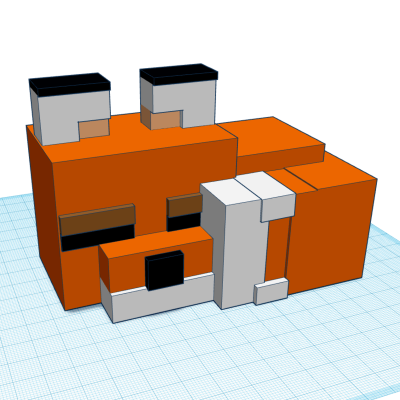Summer break has started over here, and my son went off to his first of a few day-camp-like activities last week. It was actually really cool – a workshop held by our local Fablab where they have the kids make a Minecraft building and then get to 3D-print it out. He loves playing and building in Minecraft, so we figured this would be right up his alley.

I had naively thought that it would work something like this: the kids build something in Minecraft, and then some software extracts the build and converts it into an STL file. Makes sense, because they already are more-or-less fluent in Minecraft modelling. And as I thought about that, it was a pretty clever idea.
But the truth was even sneakier. They warmed up by making something in Minecraft, then they opened up TinkerCAD, which was new to all of the kids, and built a 3D model there. Then they converted the TinkerCAD models into Minecraft, and played with what they had just built while the 3D printers hummed away.
The kids didn’t even flinch at having to learn a new 3D modelling tool, and the parallels to what they were already comfortable doing in Minecraft were obvious to them. My son came home and told me how much easier it was to do your 3D modelling in “this other Minecraft” – he meant TinkerCAD – because you don’t need to build everything out of single blocks. He thought he was playing games, but he’d secretly used his first CAD tool. Nice trick!
Then I look back and realize how much I must have learned about computers through playing as a kid. Heck, how much I still learn through playing. And of course I’m not alone – that’s one of the things that shines through in a large number of the projects we feature. Hack on and have fun!
















That’s a really cool experience for a kid to have! Makes me wanna learn more now too!
I am really looking forward to the near future when 3D CAD is no longer the bastion of a few mechanical engineering gurus and we have a whole generation of kids for whom CAD isn’t work, it’s fun.
Yep, free labor!
B^)
For users of CC3+, cad actually is fun, even if most don’t realize it’s cad underneath.
Many years ago (about 1997~2001) we ran a “computer club” for autistic adults. I was a founding member of the group.
I say “computer club” — it was modelled off Toastmasters (a public speaking club)… we used to meet each week on a Thursday night… and each night, one of the group would have to give a talk to the group on some topic of interest — with constructive feedback provided at the end. At the end of the year, each of the group would do a talk in front of a larger audience made up of relatives/carers etc.
It was all about social skills … we just used computers as the carrot to entice interaction. The venue was the Autistic Children’s Association of Queensland (now called Autism Queensland) campus at Hellawell Road, Sunnybank QLD, and on our team was a psychologist from the centre who provided professional guidance.
The idea actually worked quite well… and we had adults who had varying levels of social skills and talking ability, doing talks in front of groups.
One year when we were doing the final year talks… the computer we were using for presentations was acting up (IIRC they were late-model Pentium machines with Windows 95 — the OEM code I can still remember to this day as it was muggins that maintained them!). Normally with someone on the ASD spectrum, that sought of issue would cause a major blow-up. Not this group — they took the failures in their stride and carried on.
I think I’ve refused to use PowerPoint for presentations ever since (at high school I would up using MacroMedia Flash, then later at uni, latex-beamer).
Sadly, the group eventually disbanded. Politics forced the psychologist we had there to resign, and the replacement was one of the regular teachers who didn’t have the psychology background. He also didn’t understand what the group was really about (and didn’t seem to want to). The group floundered for a little while, before we eventually called it quits.
We did try to re-start the group at another venue (Asperger’s Syndrome Support Network… at Zillmere), but we didn’t have the psychology back-up and it really didn’t take off. That fizzled out without going anywhere.
My point to the above story is that yes, you absolutely can teach a skill using such proxy techniques. It does work, and it doesn’t really matter what the subject matter is, whether it be music, photography, computers, gardening, CAD… whatever. It helps greatly to have a few on the team that have a variation in backgrounds. In our case we had people from Engineering, Arts and Psychology backgrounds… and that mix worked for a computer club. A group less focussed on ASD probably would have less need for psychology back-up… but it’ll really depend on the group.